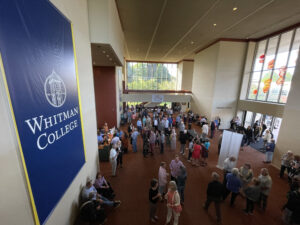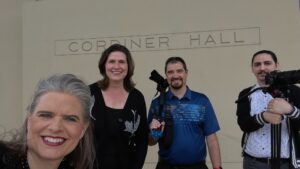The process of editing is what I enjoy most —putting the pieces together and making sense out of them. — Christian Marclay, Swedish Artist
What you see on BMT is deceptively simple. From programming from our affiliate, The Hope Channel, to shows created here at our Wallula Facility, even the most straightforward presentations require hours of thought and artistry. Meet Alex Murcia, Blue Mountain Broadcasting Editor and a Hometown and Daily Bread film crew member. We sat down recently to talk about what he does, how he does it, and what makes a good editor.
Q. Thanks for letting us dig into your job a little, Alex! All of us here at BMT know and love you, but you’re largely invisible to our viewers. Tell us a little about what you do for them!
The most essential part of my job is ensuring things feel natural. I remove distracting elements and find ways to make sure that the viewer if they walked into this conversation, would feel like it makes sense and not like they’d fallen into another dimension. Sometimes, that means cutting and reordering a conversation a bit to make it more understandable and ensure the context is clear. Other times, it’s correcting technical issues or mistakes. But whatever it is, if you can tell something is missing, I’m not doing my job. Q. Context is a big deal. We hear a lot today about statements and events being edited falsely. How do you approach that? I started as a writing editor. One of the things you learn is to take care of grammatical issues. We don’t speak in typos. So, the big crossover between these two types of editing is context. I watch every recording, sometimes more than once, to ensure I understand the speaker’s intent so I don’t undermine what they are saying. I must ensure that the context of the thought remains true to what the speaker intended and their story.
Q. B-roll —the extra clips that we film and add in—how do you decide what to use and how to use them?
 When we speak, we often make errors, talk of things a viewer might not know, or are a bit inconsistent and obtuse. So, I will cut in B-roll to clarify a point for the viewers. You may not know what a Lion’s Mane mushroom is, but you’ll never forget it if you see one. I want to make sure you get that visual. Other times, it is to cover a technical glitch or an extra long pause or fumble in an answer. Recently, for instance, on our Symphony Special, our cameras overheated, and we lost some video. Fortunately, we had the voice recording. Using B-roll allowed us to use critical information with engaging visuals and keep the story cohesive for the viewers. The critical part is that when I’ve done an excellent job, all of my work should be invisible, and their story should be clearly presented.
When we speak, we often make errors, talk of things a viewer might not know, or are a bit inconsistent and obtuse. So, I will cut in B-roll to clarify a point for the viewers. You may not know what a Lion’s Mane mushroom is, but you’ll never forget it if you see one. I want to make sure you get that visual. Other times, it is to cover a technical glitch or an extra long pause or fumble in an answer. Recently, for instance, on our Symphony Special, our cameras overheated, and we lost some video. Fortunately, we had the voice recording. Using B-roll allowed us to use critical information with engaging visuals and keep the story cohesive for the viewers. The critical part is that when I’ve done an excellent job, all of my work should be invisible, and their story should be clearly presented.
Q. What are your biggest challenges When you are filming and know you have to go into the editing room with the footage later?
Well, the biggest are technical problems. Being a small community-supported station means that we don’t have the same equipment as huge organizations. In fact, many small productions just stick to studio work because of because location shoots require crews to work around certain things. Not that technical issues don’t occur in big studios, but tiny crews, short deadlines, and mid-range equipment require extra steps and care. We’ve decided to accept and learn through mistakes and take on the challenge of taking our viewers out of the studio as much as possible. It’s a lot more enjoyable for all of us. Hopefully, it’s fun to watch us learn the hard way sometimes. Second, editing is difficult when a guest or a presenter does not speak clearly or quickly. If you are ever a guest, my best advice is to speak clearly and loudly and pause between your sentences. Finally, we run into issues out of our control on location— like wind, cars, planes, people who want to distract, and people who don’t want to be filmed. We do our best to be aware of our surroundings and kind even when we have time pressure.
Q. We just wrapped up our season. What do you want people to take away from Hometown and Daily Bread?
 I want them to discover that there are some real gems hidden in this community. If you’ve lived here long, you can feel like it’s small and isolated. Still, unique places and people make this a flourishing community. It reminds us we all need to get out more! I want viewers to feel inspired and ready to face a new day. To come away with peace and hope and have the right mindset for whatever comes their way. If those things happen, and no one notices what I did, my job is done.
I want them to discover that there are some real gems hidden in this community. If you’ve lived here long, you can feel like it’s small and isolated. Still, unique places and people make this a flourishing community. It reminds us we all need to get out more! I want viewers to feel inspired and ready to face a new day. To come away with peace and hope and have the right mindset for whatever comes their way. If those things happen, and no one notices what I did, my job is done.
